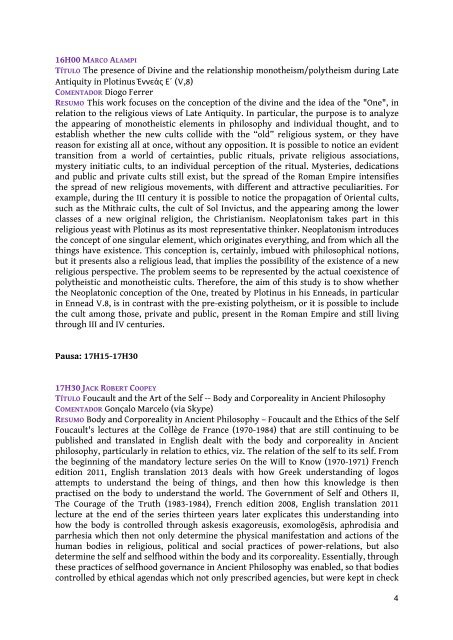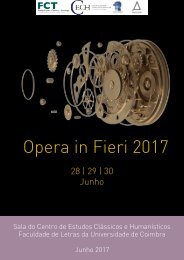Resumos PT
Create successful ePaper yourself
Turn your PDF publications into a flip-book with our unique Google optimized e-Paper software.
16H00 MARCO ALAMPI<br />
TÍTULO The presence of Divine and the relationship monotheism/polytheism during Late<br />
Antiquity in Plotinus Ἐννεὰς Ε ́ (V,8)<br />
COMENTADOR Diogo Ferrer<br />
RESUMO This work focuses on the conception of the divine and the idea of the "One", in<br />
relation to the religious views of Late Antiquity. In particular, the purpose is to analyze<br />
the appearing of monotheistic elements in philosophy and individual thought, and to<br />
establish whether the new cults collide with the “old” religious system, or they have<br />
reason for existing all at once, without any opposition. It is possible to notice an evident<br />
transition from a world of certainties, public rituals, private religious associations,<br />
mystery initiatic cults, to an individual perception of the ritual. Mysteries, dedications<br />
and public and private cults still exist, but the spread of the Roman Empire intensifies<br />
the spread of new religious movements, with different and attractive peculiarities. For<br />
example, during the III century it is possible to notice the propagation of Oriental cults,<br />
such as the Mithraic cults, the cult of Sol Invictus, and the appearing among the lower<br />
classes of a new original religion, the Christianism. Neoplatonism takes part in this<br />
religious yeast with Plotinus as its most representative thinker. Neoplatonism introduces<br />
the concept of one singular element, which originates everything, and from which all the<br />
things have existence. This conception is, certainly, imbued with philosophical notions,<br />
but it presents also a religious lead, that implies the possibility of the existence of a new<br />
religious perspective. The problem seems to be represented by the actual coexistence of<br />
polytheistic and monotheistic cults. Therefore, the aim of this study is to show whether<br />
the Neoplatonic conception of the One, treated by Plotinus in his Enneads, in particular<br />
in Ennead V.8, is in contrast with the pre-existing polytheism, or it is possible to include<br />
the cult among those, private and public, present in the Roman Empire and still living<br />
through III and IV centuries.<br />
Pausa: 17H15-17H30<br />
17H30 JACK ROBERT COOPEY<br />
TÍTULO Foucault and the Art of the Self -- Body and Corporeality in Ancient Philosophy<br />
COMENTADOR Gonçalo Marcelo (via Skype)<br />
RESUMO Body and Corporeality in Ancient Philosophy – Foucault and the Ethics of the Self<br />
Foucault's lectures at the Collège de France (1970-1984) that are still continuing to be<br />
published and translated in English dealt with the body and corporeality in Ancient<br />
philosophy, particularly in relation to ethics, viz. The relation of the self to its self. From<br />
the beginning of the mandatory lecture series On the Will to Know (1970-1971) French<br />
edition 2011, English translation 2013 deals with how Greek understanding of logos<br />
attempts to understand the being of things, and then how this knowledge is then<br />
practised on the body to understand the world. The Government of Self and Others II,<br />
The Courage of the Truth (1983-1984), French edition 2008, English translation 2011<br />
lecture at the end of the series thirteen years later explicates this understanding into<br />
how the body is controlled through askesis exagoreusis, exomologēsis, aphrodisia and<br />
parrhesia which then not only determine the physical manifestation and actions of the<br />
human bodies in religious, political and social practices of power-relations, but also<br />
determine the self and selfhood within the body and its corporeality. Essentially, through<br />
these practices of selfhood governance in Ancient Philosophy was enabled, so that bodies<br />
controlled by ethical agendas which not only prescribed agencies, but were kept in check<br />
4






